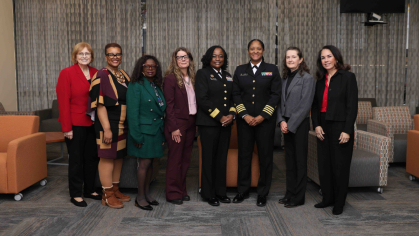Colleagues,
I am writing today about the recent release of Social Work licensure pass rate findings from the Association of Social Work Boards (ASWB). Apologies in advance for the length of this communication.
As you know, ASWB is the organization that brings together state licensing boards from around the country, and the organization that commissions the administration of the widely used licensing exams. Those exams are created and administered by Pearson, one of the largest testing companies. The data released by ASWB is shocking in the level of disparity in pass rates, and in the pervasiveness of those disparities across regions and educational programs. Many are arguing that this is one of the most important professional Social Justice issues the profession has ever faced, coming to light at a time when the need for diverse mental health clinicians is imperative.
To keep our Rutgers social work community up to date on developments, we have created a page on our website, ASWB Licensing Concerns, where we will be posting statements from organizations, op-eds, and other information about the issue. I encourage you to spend some time with those materials.
As many of you know, ASWB released some analyses of exam pass-rates that show staggeringly large disparities in license pass rates between test-takers of differing races, ages and first-language statuses. These disparities are very large. For example, nationwide, while 91% of White test takers eventually pass the exam (perhaps after multiple tries) only 57% of Black test-takers eventually pass. All other racial groups fall between these two figures. Young test-takers eventually pass at a 91% rate, while those older than 50 pass at a 65% rate. Only 70% of test-takers whose primary language is not English eventually pass.
It is perhaps important to note that virtually all standardized tests show racial disparities, at all educational levels. This is partly why many colleges and universities have gone test-optional for admission at the undergraduate and graduate levels. We know that disparities exist in the professional licensing exams as well. However, as a comparison, the disparity between Black and White test-takers in one of our allied health professions is less than 10 points.
It is important to disentangle the issue of licensure from the methods used to award it. Social Workers fought long and hard battles in each state to attain licensure, which is tied to a host of benefits for social workers. Licensure protects the title, ensuring that only those with social work degrees are recognized as social workers. It also protects our clients from those who would seek to claim expertise with no education or experience.
From my perspective, the problem here is not the idea of licensure, but rather the over-reliance on a potentially flawed test as the primary evidence of competence. It is long past time to consider how licensing boards might assess professional competence in a more multifaceted way. High stakes, multiple choice testing is not our only option. Most schools of social work do not employ high stakes testing to assess competence, but rather focus on multiple points of assessment, and multiple assessors to ensure that graduates have mastered course material and have competent field education performance. Should the profession wish to continue with a high-stakes exam, it is imperative that we have information on the performance of that exam, and imperative that it be shown to be unbiased.
The release of this information comes after almost a decade of advocacy from the National Association of Deans and Directors (NADD), which, following the lead of the New York Deans and Directors, has been asking for release of these data for many years. NADD has had a task force working for the past two years to increase the pressure on ASWB, because we have seen the cost to individuals and to our communities of suspected patterns in exam performance. The NADD task force, which I serve on, has been meeting weekly since the release of the data in advance of an in person meeting next week. We will provide guidance for schools as they engage in their states and will continue to pressure the three largest social work organizations (ASWB, CSWE and NASW) to build plans of action. For example, we still have almost no information on the psychometric properties of the exam.
Over the past weeks since the release of the ASWB data, multiple positions on the issue have been forming up. Some among our profession are defending the exam strongly, and you will see some of those arguments on our information website. These include arguments that schools are failing their diverse students, or that other societal disparities are causing these disparate results. Some of these arguments, in my view, display some problematic assumptions about diverse test-takers. Others are arguing for immediate suspension of use of the tests until non-biased methods of assessment can be developed and adopted. We will post everything on our website for you to engage with. If you know of publications/op-eds/organizational statements not found there, please send them to me.
Here in NJ, NASW has held listening sessions, and produced a very thoughtful statement. The NJ Deans and Directors are meeting to discuss how we might coordinate lobbying in our state. Ideas among that group include advocating for free test preparation for those who fail the exam initially and advocating for all repeat testing to be free. Some of us feel strongly that given we are one of the most diverse states in the country, with some of the most diverse BSW/BASW and MSW graduates in the country, NJ should immediate cease using the ASWB tests. NJ might consider allowing the MSW to stand for the entry credential for the LSW and build a system for assessing competence through the required clinical hours for the LCSW. These debates are going to be intense over the coming weeks and months. I hope you will become educated on this topic and think carefully about what you will advocate for in this situation. Then, be in touch with your state senators and representatives, with the NJ Board and with the Governor’s office.
Here at Rutgers, we have long ensured the exam material is covered and emphasized in our courses. It is difficult to focus on increasing pass rates when the test seems greatly flawed. But, so long as this test is used here in NJ, we will continue our robust, free, test prep program for students, which includes access to a test-prep book and practice exams, in class review of practice questions, and a non-credit course opportunity. Our faculty will meet shortly to discuss other measures we might undertake.
The Rutgers School of Social Work faculty, students and alumni can be a powerful force in this state. We stand for social justice in our profession and in our communities. Let us find a way to work together with NASW, to provide an example to other states for how powerful change in social work licensing is achieved.
We recommend continuing to check-in on our webpage and stay connected to your local advocacy organizations such as NASW-NJ. Stay tuned for more information and opportunities for engagement.
In solidarity,
Cathryn C. Potter
Dean & Distinguished Professor
Rutgers School of Social Work



